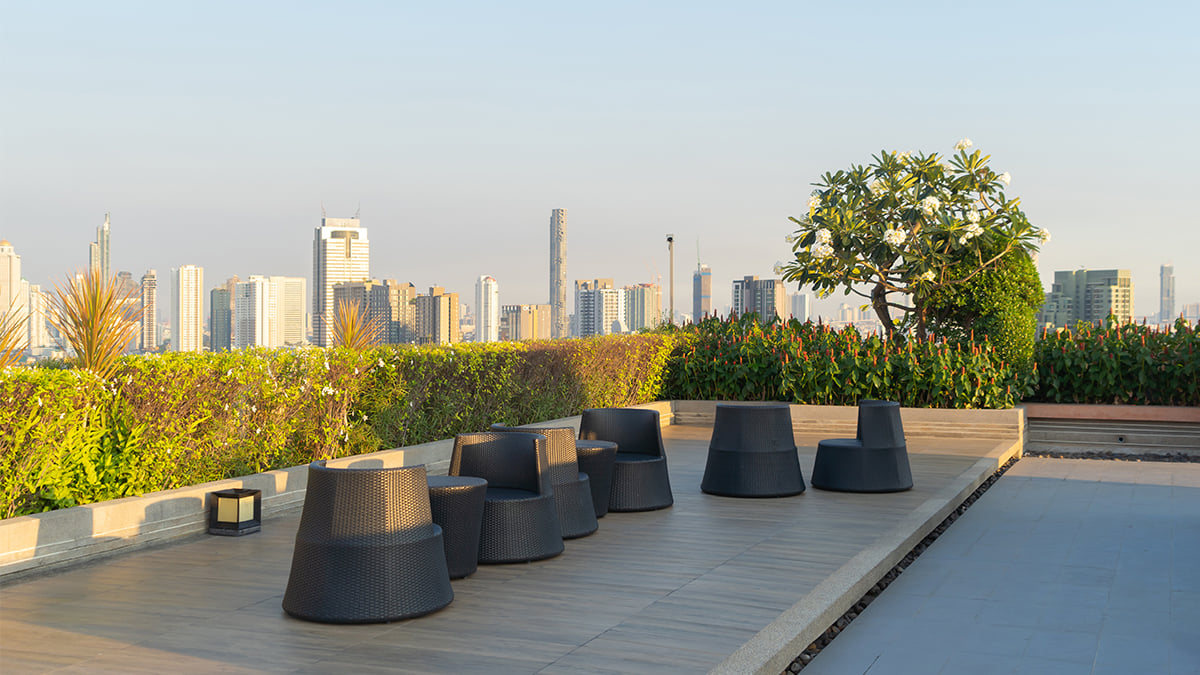In an ever-evolving hospitality industry, sustainable hotel ideas have emerged as a crucial strategy to stay relevant, deliver exceptional guest experience, and maintain profitability.
The importance of sustainability in hotels
Sustainability in the hotel industry plays a vital role, not only from an ecological standpoint but also in shaping the public perception of the business.
As global awareness about climate change and environmental degradation intensifies, businesses are being held accountable for their ecological footprint. Hotels, as active contributors to the local economy and heavy users of resources, are no exception.
Consider the following statistics:
- In one survey, 83% of participants reported that they want to travel more sustainably.
- Around 33% of guests conduct research on a hotel's environmental and social practices before making a booking.
- Hotels account for approximately 1% of global carbon dioxide emissions. That translates to roughly 363 million tons of CO2 annually — enough energy to power around 45 million homes.
An environmentally-conscious guest now prefers a room in an environmentally friendly hotel over a conventional one, driving the demand for sustainable hospitality. This shift in consumer behavior is a clear indication of the public's increasing expectation for hotels to adopt sustainable practices.
Sustaining ecological practices in hotels offers numerous benefits. Energy-efficient operations, waste reduction, and water conservation significantly decrease environmental impact, helping combat climate change. Additionally, sustainable procurement practices like sourcing local goods promote the local economy and reduce carbon emissions from transportation.
In essence, the advent of sustainable hotel practices is not merely a trend, but a necessary evolution in response to global environmental challenges and changing consumer behavior.
By failing to adopt such practices, hotels risk alienating a growing segment of environmentally conscious guests, damaging their public image, and, ultimately, their profitability.
Additional reading: best LED lights for warehouse
How can hotels be more sustainable?
So this brings up the question — how can hotels become more sustainable?
The answer lies in implementing eco-friendly hotel practices throughout every aspect of the business. From energy management to waste reduction, water conservation to sustainable procurement, there are many ways hotels can become more environmentally responsible while maintaining high levels of efficiency and profitability.
Implementing sustainable hotel management allows hotels to participate in global sustainability efforts while meeting the preferences of their clientele. This approach integrates eco-friendly practices into everyday operations, creating a green and profitable hotel.
It involves assessing waste disposal, energy consumption, and reducing the environmental footprint while ensuring guest satisfaction.
With this in mind, let's look at innovative green hotel ideas. These concepts take sustainability to the next level, introducing environmentally friendly practices that may not be commonplace yet, but have the potential to redefine what it means to be a "green" hotel.
Additional reading: commercial lighting for restaurants
7 Sustainable hotel ideas
If you want to make your hotel truly sustainable, these eco-friendly hotel ideas will help you reduce your hotel's environmental impact:
1. Switching to LED lighting
One of the most impactful and cost-effective changes a hotel can make is switching to LED hospitality lighting.

LEDs consume significantly less energy than traditional incandescent bulbs, translating to substantial savings on electricity bills. Additionally, with a lifespan up to 25 times longer than conventional bulbs, the benefits of LEDs extend beyond just energy savings; they also reduce maintenance costs and the environmental impact associated with bulb disposal.
At FES, we specialize in helping hotels make this vital transition. We offer a comprehensive range of LED lighting solutions, tailored to meet the unique needs and aesthetics of your property.
We also supply LED lighting for restaurants and other commercial and residential spaces. No matter the industry, our clients consistently report not just lower energy consumption and costs, but also enhanced guest experiences, thanks to the superior quality of light that LEDs provide.
Additional reading: commercial lighting cost per square foot
Contact us today to find out more about how to reduce energy consumption in commercial buildings and light the path to sustainability for your hotel! We offer free LED lights for business via financing and rebate programs.
2. Phase out disposable plastics
Going green in the hospitality industry signifies minimizing and ultimately eliminating the use of disposable plastics, especially since today's conscientious traveler is increasingly concerned about plastic waste.
Hotels can actively become part of this change by implementing alternative solutions:
- Smart locks, access codes, and keyless entry systems: Replace plastic keycards with these smart alternatives to not only minimize plastic waste but also enhance guest experience.
- Minimize usage of straws, disposable cups, and cutlery: Unless absolutely necessary, avoid offering these items. If required, opt for reusable or biodegradable substitutes like bamboo straws.
- Ditch single-use plastic water bottles: Instead, provide guests with a reusable, branded bottle and install water dispensers at various locations.
- Offer filtered tap water at your restaurant: If it's safe to drink, place pitchers of filtered tap water on tables, minimizing the need for bottled water.
- Choose sustainable packaging: Whenever possible, purchase produce in recycled, biodegradable, or sustainable packaging.
- Encourage recycling: If reduction or reuse isn't feasible, place clearly marked recycling bins around the hotel for guests to segregate their waste.
Additional reading: restaurant lighting design
3. Invest in automated energy control systems
Energy consumption is a significant expense for hotels and a major contributor to CO2 emissions.
For example, many modern, efficient HVAC systems allow for tailored airflow, heating, and cooling by monitoring room occupancy and enabling guests to personalize temperature schedules. This ensures energy is only used when necessary, without sacrificing guest comfort. Such solutions can be paired with commercial LED conversions to maximize energy efficiency and cost savings.
To further enhance your energy-saving measures, consider installing motion sensors around the premises to control lighting. Not only does this cut costs, but it also benefits local wildlife by reducing light pollution.
Switching to a renewable energy provider can also be beneficial, but it is crucial to verify their credentials to avoid greenwashing.
Finally, tree planting can provide natural shade for buildings, reducing the need for air conditioning.
Additional reading: importance of lighting in retail stores
4. Clamp down on food and water waste
According to the World Food Programme (WFP), approximately one-third of food produced for human consumption is wasted, emitting a staggering 3.3 billion tonnes of CO2-equivalent greenhouse gasses. Many hotels contribute considerably to this waste due to the challenges of providing standardized meals and anticipating consumption.
To combat food waste and emissions, consider the following:
- Go for locally sourced, seasonal, organic produce: Reduces food miles and pesticides, offers healthier meals, and is usually appreciated by guests. If feasible, start your own kitchen garden.
- Reduce meat consumption: Particularly beef, which contributes significantly to CO2 and methane emissions and requires substantial land and water resources. Always ensure any meat served is free-range, organic, local, and adheres to high animal welfare standards.
- Separate and dispose of food waste correctly: Composting food waste can produce natural fertilizer for your grounds. Consider a local composting program or a worm bin to expedite the process and control pests and odors.
- Donate unused food to local charities or food banks, and finally compost for fertilizer.
- Eliminate buffet trays and single-serving packets: Opt for individual portions and jars, instead.
Water scarcity is a pressing environmental issue, made more stark in regions where locals lack clean drinking water while tourists have abundant access. As a responsible hotelier, you can reduce water consumption by:
- Encouraging guests to reuse linen and towels: Equip rooms with adequate towel racks and communicate this request clearly to your guests.
- Install timed or smart irrigation systems: Use local, drought-resistant plants to reduce water and pesticide use where rainfall is minimal.
- Using rainwater or greywater collection systems for non-potable uses such as toilet flushing. Greywater heat recovery systems also help capture and reuse energy lost when hot water goes down the drain.
- Investing in water-saving appliances: Install faucet aerators, use low-flow showerheads, and replace toilets with dual or low-flush models.
Additional reading: LED sports lighting retrofits
5. Transition to hybrid or fully electric vehicles
Significant carbon emissions result from guest travel to and from hotels. However, certain green initiatives can be taken to reduce these environmental impacts.

One effective strategy involves transitioning your corporate fleet to hybrid or electric vehicles. Although the upfront costs of these may be higher than those of gas-powered vehicles, long-term savings estimated at $6,000 to $10,000 can be achieved over the vehicle's lifetime in fuel and maintenance costs.
Furthermore, consider providing eco-friendly transportation alternatives such as bikes, e-bikes, and e-scooters for guest use. This not only reduces carbon emissions but also enhances the guest experience by providing a fun and unique way to explore local attractions.
To minimize low-occupancy trips, hotels can offer group shuttles or switch from fixed-route-and-schedule services to flexible, on-demand services. With this innovative approach, passengers can request a ride via an app, and algorithms then match them with other guests traveling in the same direction.
Additional reading: baseball field lights
6. Support the local community
Supporting the local community does not just fulfill social responsibilities but also establishes a brand as a sustainable and socially conscious entity. As hoteliers, it is essential to ensure that the benefits of tourism seep into the local economy and contribute to its growth.
Start by sourcing from local farmers and producers. Incorporate local crafts, furnishings, and toiletries into your hotel's ambience and make these items available for purchase at reception or in the gift shop.
Hotel operators should also think about recommending local bars and eateries to your guests instead of chain restaurants. These recommendations can be publicized through your guest portal which could also serve as a platform for retail or food delivery orders from these local establishments.
Another strategy is to organize visits to local workshops or studios and offer on-site demonstrations and classes. Provide your guests with opportunities to engage in local walking, biking, or hiking excursions and trips to natural or cultural heritage sites. These initiatives not only offer an authentic local experience but also help visitors avoid crowded tourist spots.
Additional reading: are fluorescent lights bad for you
7. Embrace Sustainability with a Rooftop Garden
Transforming your hotel's rooftop into a verdant oasis not only offers a unique amenity to your guests but also contributes significantly to your sustainability initiatives. A green rooftop mitigates the environmental impact of your operations, helping to offset your hotel's carbon footprint. Every square foot of greenery makes a difference in this vital effort.

Rooftop gardens provide a tranquil retreat for your visitors, offering a space for relaxation and leisure. Imagine the appeal of savoring a meal or a drink amidst lush greenery, with the cityscape as the backdrop.
Such a feature can make your establishment a sought-after destination, attracting eco-conscious travelers and setting you apart in the fiercely competitive hospitality industry. Combine this with appropriate restaurant lighting ideas for an enhanced atmosphere.
Moreover, rooftop gardens help reduce heat absorption, thereby lowering energy usage for air conditioning. They also aid in rainwater management and foster biodiversity by providing a habitat for pollinators.
Additional reading: how to block fluorescent lights at work
Key takeaways on sustainable hotel practices
In the modern age of travel and hospitality, sustainability practices in hotels have become a defining factor for discerning guests seeking eco-friendly accommodation. Implementing sustainable strategies not only betters your brand image but also drives economic growth.
By championing sustainability practices in hotels, we not only safeguard our planet for future generations but also catalyze a new era of responsible and sustainable tourism.
To shift towards a more sustainable future for your hotel, considering upgrading to LED lights with us. Contact us today to find out more.
Recommended Reading:




%20(1).png?width=1080&height=1080&name=FES-Ebook-1%20(1)%20(1).png)